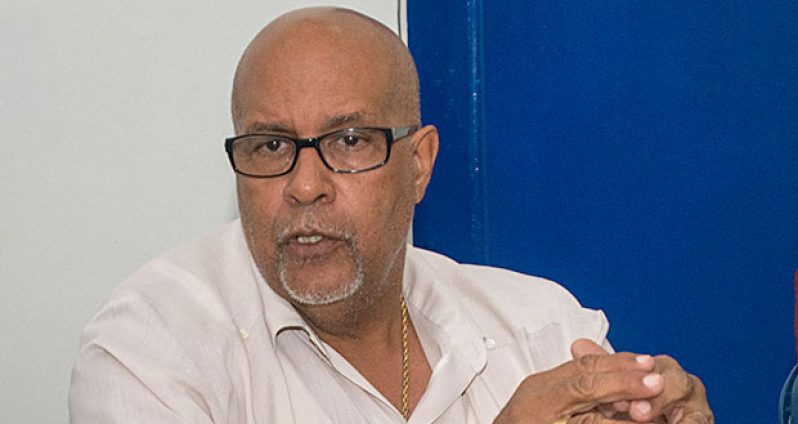DECLARING that it has not replaced chlorine as its main purifier of water, the Guyana Water Incorporated (GWI) has dismissed reports carried in some sections of the media that it has turned to the yet untried and untested Antinfek to purify water.GWI, in a statement on Monday, said Antinfek is an organic chemical being researched by the company for effective disinfection prior to distribution to the public; but it has not been put to use and has not replaced chlorine for the decontamination of water.
“GWI also wishes to categorically state that chlorine is being used as the sole disinfecting agent in all the treatment plants, while laboratory studies are being done on the use of other treatment alternatives.”
GWI has revealed that for the period September–October 2016, it purchased 342 cylinders of chlorine gas from JCI Jones Chemicals and ANSA McAL Group of Companies to treat water. As the nation’s sole water utility, GWI is cautioning media outlets to thoroughly research and investigate their findings before publishing articles that seek to cause public panic.
According to the GWI statement, Managing Director Dr. Richard Van West-Charles had noted with deep concern the inadequate efforts that were being placed on disinfection and filtration when he took over at the helm of the organisation. Thus the decision was made to research the use of Antinfek as a means of boosting the treatment of water to ensure an overall better quality of water intended for distribution.
“With quality as a top priority, GWI is constantly finding new solutions to reduce the prevalence of water-borne diseases, especially in hinterland and riverine areas. One such method for improved quality is the use of filters which have been (subjected) to robust analysis and have been proven to effectively and consistently remove microbial contamination. Additionally, GWI has implemented a 24-hour laboratory at its Shelter Belt location to test water for any contamination, even as it moves to establish mini labs at all of its water treatment plants countrywide,” the statement detailed.
GWI has also said it was found that the residual concentration of chlorine has a short life, thus does not protect the water from recontamination during prolonged storage. The residual concentration is also consumed by organic and inorganic substances which may become present during distribution.
“Therefore, when the water goes into a black tank, the effectiveness of the protection that chlorine offers is reduced. GWI’s aim is therefore to boost the pressure of its distribution system, coupled with 24hr supply, thereby allowing customers not to become dependent on storing water in black tanks, and to resort to direct use from their taps. Chlorine is also known to cause disinfection by products (DBP’s) which are carcinogenic.”
According to GWI, water distributed to the nation must be safe for consumption, and delivering water of compromised quality is not an option for the utility.
“To date, research shows that Antinfek was tested by a number of other laboratories in countries such as Hong Kong, China, Thailand, Switzerland, Ghana, Nigeria, India, Pakistan, Kenya, Trinidad & Tobago and Germany, all showing favourable results in its use. Among the uses for the active ingredient in Antinfek are: disinfection of fruits and vegetables, wound dressings, eye drops, baby wipes, and disinfection of pools and spas etc.
The reference made in the local newspapers regarding its rejection in Haiti is based on a study done by one university, which is insufficient to disregard its advantages altogether.” It should also be noted, GWI said, that the use of Antinfek was not introduced to Guyana by GWI, as it is currently being utilised by other organisations in the country for disinfection of water for human consumption.
IRRESPONSIBLE
The water company has also responded to comments on the issue made by Director of the Government Analyst Food and Drug Department, Marlan Cole, saying that those remarks, coming from a senior government functionary, were inaccurate and irresponsible.
“Instead of contacting GWI to gain clarity on the thinking behind the use of Antinfek and whether or not chlorine was still being used, Mr. Cole added to an unnecessary cause for public alarm”.
The utility would like to reiterate that all of the water treatment plants are using chlorine as their sole disinfecting agent (some using chlorine gas, calcium hypochlorite powder, and sodium hypochlorite produced from brine). These plants include: Shelter Belt; Central; Sophia; Eccles; Lima; Bartica; Pouderoyen; Fellowship, Vergenoegen; Amelia’s Ward; LPC; Mackenzie; West Watooka; Wisroc; Better Hope; Mon Repos; Cotton Tree; New Amsterdam; Port Mourant; No. 56 Village and Queenstown.
The company has said that all customers can rest assured that GWI is committed to distributing safe and uncontaminated water at all times.
“We cannot knowingly distribute water that is contaminated by pathogens. Our first call is to ensure that whatever water is distributed is safe for consumption”, Dr. Van West-Charles has posited.



.jpg)








